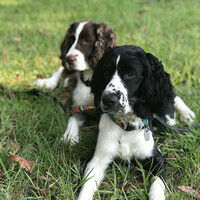Does anyone use this with Sibelius? My composition teacher has been after me for over a year to get it and use it as a way to test out/play back scores before printing charts for live performances.
If you have it do you use it for anything else? Is the playback good enough for electronic scoring?
Here is the quandary I have been in lately - I have been using Kontakt samples with Cinesamples being my primary orchestral set. As there is only one 'soundset' for Cinebrass, I have decided sometime back to use 'manual soundsets' and hidden MIDI commands to control the use of electronic playback. That has caused me to leave out things like slurs (which I could have left in I guess but just have no playback impact for them) and to hide pedal usage, among others.
The other impact is I have been using treble staffs for all my percussion whether they be pitched or not - and I used whatever notes were assigned to the samples with no drum maps. The problem/issue being that I have not been able to use unpitched staffs or 1 line staffs and I wasn't able to generate a reasonably playable percussion chart for a live musician.
Note performer appears to have the potential of eliminating much of the notational shortcomings associated with playing of my scores as a check before I print them for live performance. I am thinking it may fall short as a solution for electronic scoring but I don't know.
What can y'all tell me about your experiences with this product if you have it? $129 is not much of an investment considering what I have already spent on samplers and samples.



Have not heard sounds, or program Joel.
Though, Dorico could be another option.
Steinberg Dorico can use your current sounds.
1.2 is our now and does percussion writing. Now. May be worth the Trial to check it out.
Not sure how Dorico would handle XML transfers w Your treble clefs, though could change pretty easy in Sibelius before trying in new program.
Your sounds should add easily.
The Crossgrade is still going on.
Have a great weekend.
Kerry Kennard
I use Sibelius to write everything. I write everything in notation and then export the MIDI data to Logic for playback with my sample sets. I love it. I used it when I started writing a long time ago, when I went to university I had to switch to Finale, but as soon as I was done I went right back to Sibelius. A lot of things are easier to do on it, like quarter tones and stuff.
The sibelius sounds that come with it are ok for mockups, and writing but they are nowhere the quality of a good sample set like Cinesamples or Spitfire.
I use Finale myself, and don't own NotePerformer. I've heard some demos with NotePerformer, though. For a quick playback I suppose it's fine. I haven't found any demos that could pass as a decent electronic score, yet. There's a decent one here: https://soundcloud.com/douglas-gibson/batman-noteperformer-2, but even then, there's a lot more to be had if we're talking final product, IMO.
My personal take is that you shouldn't need to test out your score since you're able to hear the score in your head, where it was composed in the first place. If you're checking for errors, the Sibelius sounds should be more than adequate. If you're making a demo or a final track, I'd suggest starting a second file, use Sibelius as a sequencer (without regard to how it looks notation-wise) and use your Cinesamples to play the parts in in real time (I'm assuming Sibelius can do this, yes?). I've always been an advocate of performing parts in real time and capturing expression through controllers like faders, pedals, wind/breath controllers, optic controllers, etc. I just think the end product is more musical. Here's an example of a snippet from Fauré's Sicilienne I created in Digital Performer using EWQL Pianos Platinum and Audio Modeling's The Cello with a WX5 wind controller: https://soundcloud.com/jonathanprice/le-sicilienne-poc. I find sequencers a great tool to create in-the-box scores, especially on the mixing end of the spectrum. But even on the MIDI end of the spectrum, I was able to play the cello line in free (no click), and then go back and quickly create a tempo map so I could play the piano accompaniment with click. Maybe that's what you're doing in Sibelius already (while trying to keep everything in one file), but If it's difficult to do that in Sibelius (whose primary purpose, after all, is notation), Reaper is an inexpensive sequencer ($60) that has similar, if not more, features than Digital Performer (which has a current crossgrade price of $195 and is normally $395). And, of course, there's Logic and Cubase.
1 person likes this
Jonathan - I agree. Much better for use to demo or do a quick listen to a jazz chart. I purchased it because it seemed to do a better job at allowing me to use standard drum notation.
I have since purchased a drumset from Native Instruments (same company as Kontakt) called, "Abbey Road Modern Drums" and then purchased a Sibelius soundset for it from "The Soundset Project". It works pretty well and also gives me standard notation for the most important features of that Drum set. I am currently using it to provide a jazz-themed score to my current film.
www.native-instruments.com/en/products/komplete/drums/abbey-road-modern-drummer/
www.soundsetproject.com/soundsets/native-instruments/abbey-road-modern-drums
Kerry - without going into a lot of detail, I have been aware and following the dorico development ever since the team left avid and moved to steinberg. I have had multiple discussions on their forum about their security paradigm/framework. I will not try out Dorico until they allow me to purchase a single license and use it either on my desktop or laptop (not simultaneously) without using a hardware security key - sort of like the way SIbelius currently works.